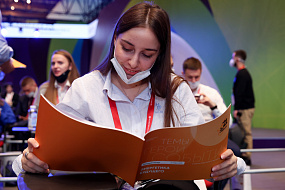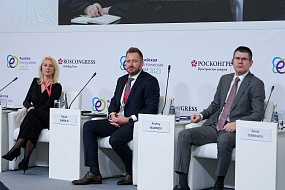Nikolay Shulginov: “Ministry of Energy Intends to Adjust Russia’s Energy and Expand the Planning Horizons in Fuel and Energy Industry”

One
of the key sessions of Russian Energy Week – ‘Global Challenges and
Opportunities in Electric Power’ took place on 14 October. The session was
attended by Russian Ministry of Energy Nikolay Shulginov, Brazilian Minister of
Mines and Energy Bento Albuquerque, UN Economic Commission for
Europe Executive Secretary Olga Algayerova, Rosseti General Director Andrey
Ryumin and Rosatom State Atomic Energy Corporation First Deputy General
Director and Director of the Development and International Business Unit Kirill
Komarov.
Shulginov
noted that Russia needs to develop the country’s energy balance in order to implement
the Sustainable Development Goals and achieve carbon neutrality no later than
2060, which will require changes to the Energy Strategy.
“What
do improvements to the energy balance entail? We need to change certain goals that
have been set in the Energy Strategy for the period up to 2035,” he said.
The
period until 2035 solely concerns the operation of existing generating
facilities, while the period until 2060 involves the energy of the future, he
said. Thus, the planning horizons in the Energy Strategy need to be expanded.
“We
still face the goal of modernizing the thermal power industry, which is already
being carried out as part of the programme. This programme is calculated until
2031. We intend to extend it further. We have also set the task of increasing
the production of hydroelectric power plants in order to maintain hydropower in
the balance at a level of 19–20% with an increase in
consumption. To do this, we need to build, among other things, large
hydroelectric power plants, above all, taking into account the flood control
effect,” Shulginov said.
Shulginov
added that the share of energy produced by nuclear power plants, which today
account for about 20% of electricity generation in Russia, should increase to
24–25% by 2050. The share of gas generation will
remain around the current level of just over 40%, while coal-fired power plants
will be converted to gas. Power generation by solar and wind energy plants will
grow from about 0.5% to 4.5%, respectively, by 2035 and will continue to
increase to around 12–12.5% by 2050–2060.
“Ultimately,
we will achieve indicators based on which the share of carbon-free and
low-carbon generation, which is 41% today, will be around 47% by 2035 and 56%
by 2050,” Shulginov said.
The
Russian Energy Week International Forum is taking place in Moscow on 13–15 October. The event is being organized by
the Roscongress Foundation, the Russian Ministry of Energy, and the Moscow
Government.





